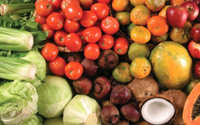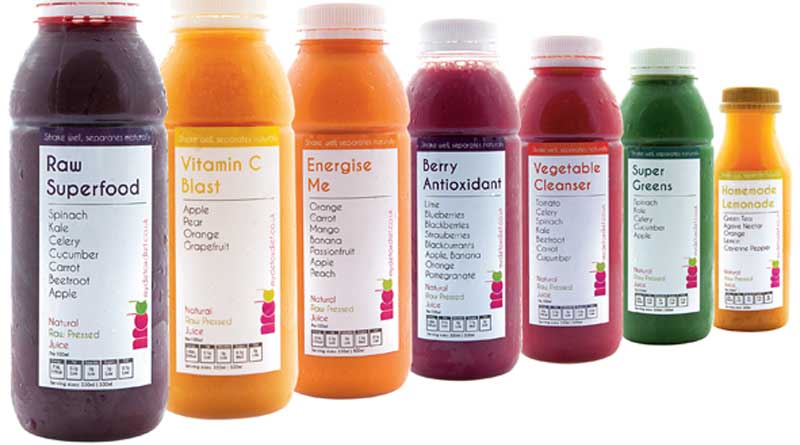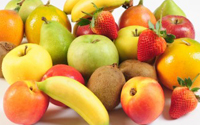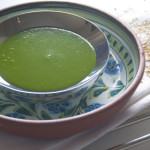IS JUICING REALLY GOOD FOR YOU?
Juicing has become part of the cultural zeitgeist. But is juicing actually more beneficial than simply upping your daily intake of fruit and veg?
One thing’s for certain – processing fruit and veg by juicing it before it hits the stomach gives the digestive system a rest and reduces that sometimes uncomfortable acid production. Essentially, taking on juices is less effort and helps the digestive system run more efficiently overall. An argument also exists that drinking raw vegetable juices demands the gut break down only one food group at a time, allowing for speedier digestion.
However, overall the answer to the ‘is juicing really good for you’ question isn’t clear-cut: downing the juice of fruit and vegetables essentially means consuming the water they hold as well as much of their vitamin and mineral goodness, but juicing also removes complex fibres and can send your sugar levels sky high. And that’s not to mention the lack of protein in most fruit and vegetable juices which is especially worth acknowledging if you’re about to embark on a juice-only fast.
But when practised intelligently and when armed with the facts, the benefits of juicing can be life-changing. Here are some tips to help you get the best out of juicing and avoid the downsides:
Eat your fruit and juice your veg
To answer the question in part, the efficacy of juicing depends on what you’re juicing. Pure fruit juices – especially pre-packaged varieties – can be high in fructose sugars (and therefore carbs and calories), but green juices made mostly from vegetables like spinach, kale and beetroot are great news for health-junkies. But let’s get one thing straight before we move on: downing a pint of green juice that contains a whole bag of kale won’t give you the same nutrient dose as you would get from eating that kale steamed with some salmon. That said, you’re still getting a pretty awesome nutrient fix that – we’re going to hazard a guess here – beats whatever you’d be eating or drinking instead. So don’t let this put you off. There’s also the added benefit that you know exactly what’s gone into your morning snack or afternoon pick-me-up. No additives, no colourants and no synthetic flavourings.

Tip: Fruit juices are high in calories and should be taken in moderation, but green juices made purely of vegetables can become dull for the tastebuds. Add an apple or some kiwi to your vegetable juice for some added sweetness.
Get your fibre fix
Most fibre in fruit and vegetables is all but completely lost in the juicing process if that pulp isn’t substituted into your diet somehow. And a diet based entirely around fruit and vegetables can become protein deficient quickly if you don’t address this issue. So if you’re not careful your juice habit could soon become a high-carbohydrate, low-protein and low-fibre habit. Not great for energy levels, hunger management or mood – let alone the laxative effect of digesting blended fruit and vegetables with no friendly fibre in the mix. You need protein to keep your metabolism ticking over properly, so your juice fast weight loss will come to an abrupt halt if you cut protein out of your diet altogether.
The solution? Make sure your diet, aside from juicing, is protein-rich and fibrous, or try to incorporate fibre and plant-proteins into your juices: artichoke, asparagus, beetroot, broccoli, carrot, onion, sweet potato, spinach and watercress for example. Denser fruits like peaches, strawberries and cherries contain protein too, so get them on your list for adding to vegetable juices or for the odd fruit juice concoction. Chia and flax seeds are both great sources of dietary fibre and protein – big favourites amongst veggies and vegans – so throw in a handful, spoon in some Greek yogurt or add a few splashes of almond milk.
Tip: Get that lost fibre back into your diet by using the pulp left behind from juicing and scooping some right back into your juice before you drink it. Alternatively, mix the pulp into your fruit muffin or pancake batter, or use vegetable pulp as a base for your homemade soup. Waste not, want not!
Chop, blend or press?
If you can stretch to it and you’re serious about your juicing, a cold press juicer will retain a huge proportion of the nutrients in your juice ingredients. By crushing the fruit and vegetables gently rather than whizzing it all up using blades and heat, fewer enzymes are obliterated in the process and more nutrients saved and passed onto you. But that’s not to say that juice from a standard juicer is simply no good, you just won’t get as much juice out of your leafy greens and you’ll struggle to process nuts and seeds as effectively. Think of the juicing process as one that literally aggravates the food more than the gentle act of pressing and you’ve basically grasped the key difference in quality between juicing and pressing. If you are buying juices from a juicing company – then make sure they are pressed. These will be far higher quality.
Tip: If your leftover pulp is still fairly wet once you’ve juiced, put it through again and see how much more juice you can extract from it before you either discard it or find another use (see tip above) for this source of fibre. Drink immediately for full nutritious value or refrigerate for no longer than two days.
ABOUT THE AUTHOR:
Ilona Wesle is a nutritionist and co-founder of MyDetoxDiet.co.uk, a leading expert in detoxing, cleansing and alkalising. With a shop and detox centre in Greenwich and a nationwide delivery service offering fresh, vegan, detox diets direct to your door, MyDetoxDiet.co.uk offers everything you need to detox your body and boost your energy. And if you are specifically looking for weight loss – then MyDetoxDiet.co.uk can design a nutrition plan to suit you.




